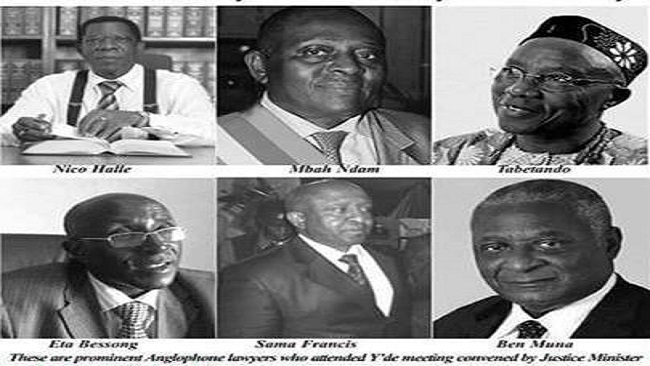CAMEROON IN CRISIS: The Anglophone Problem-Bribes or Bullets?
In 1985, a maverick English-speaking Cameroonian lawyer, Gorgi Dinka, declared that President Paul Biya had abrogated the 1961 union between French Cameroon and the Southern Cameroons by decreeing that the name of the country was no more the “United Republic of Cameroon” but simply, “Republic of Cameroon”.
Lawyer Dinka claimed that by a stroke of President Biya’s pen, French Cameroon had abrogated the Union, and that Southern Cameroonians had to create their own country called Ambazonia –derived from Ambas Bay, the protectorate that Britain established in 1884 before ceding to Germany in 1887.
With Dinka’s arrest in 1985, the Ambazonia independence movement took off. To most Anglophones who had been used to the Gestapo tactics of Cameroon dictatorship, Dinka’s arrest was just another storm in a teacup. But today, with the generalized strike launched by Common Law lawyers, engulfing other sectors of the population in the two Anglophone regions, Dinka’s revolution seem to have become a raging Prairie fire.
Yet, the senile Biya government which is adverse to sharing power in a putative federation, is digging its heels and spreading bribes and bullets. The conundrum of Anglophones who are hoping for a federation is that the French –inspired system, that prevails in Cameroon does not have the concept of a federation in its political lexicon.
The Yaoundé government has been silently implementing its policy of assimilation, gradually eroding all English –speaking institutions in the former Southern Cameroons. After the abolition of the House of Assembly (Parliament), and House of Chiefs in Buea, the predominantly French speaking government has expropriated all important positions and imposed French as the de facto language of the country to the virtual exclusion of English.
Since 1990 when the Social Democratic Front (SDF) was launched in a gush of bloodshed, Biya has been using the stick and the carrot, or bullets and bribes to contain the opposition. Fru Ndi who was a firebrand rabble-rouser, has mellowed after receiving a few million francs CFA, from Biya. (He of course denies being bribed, but encourages his followers to take any money the government gives, because it is the taxpayers’ money and not Biya’s).
Leaders of the nearly 250 opposition parties have been handsomely rewarded, making the creation of a political party one of the most profitable business ventures in Cameroon. That is why, all the leaders of the main opposition parties in Cameroon, have refused to cede power to a younger generation, because their political parties have become bargaining chips in the big money game that is Cameroon politics.
The stealthy takeover of the judiciary in the two Anglophone regions with the infusion of French speaking judges and prosecutors imposing the Civil law system and requiring lawyers to make submissions in French seems to have gone too far. It has turned out to be a risky move that has backfired.
Yet, with the failed Anglophone leadership and the culture of accepting bribes from the Yaoundé regime, most observers are skeptical that the strike action will result in far-reaching reforms. But the regime seems to have been taken aback by the grown swell of protest on the coattails of the Common law lawyers which has extended to lawyers in London and the rest of the Diaspora in Europe and North America.
Most observers believe that this is a precursor to the real storm that will be engulfing Cameroon with the imminent death of Paul Biya who at 83, is in fragile health and seems determined to die in power.
By Soter Tarh Agbaw-Ebai (Editor-in-Chief) Cameron Concord News Group




